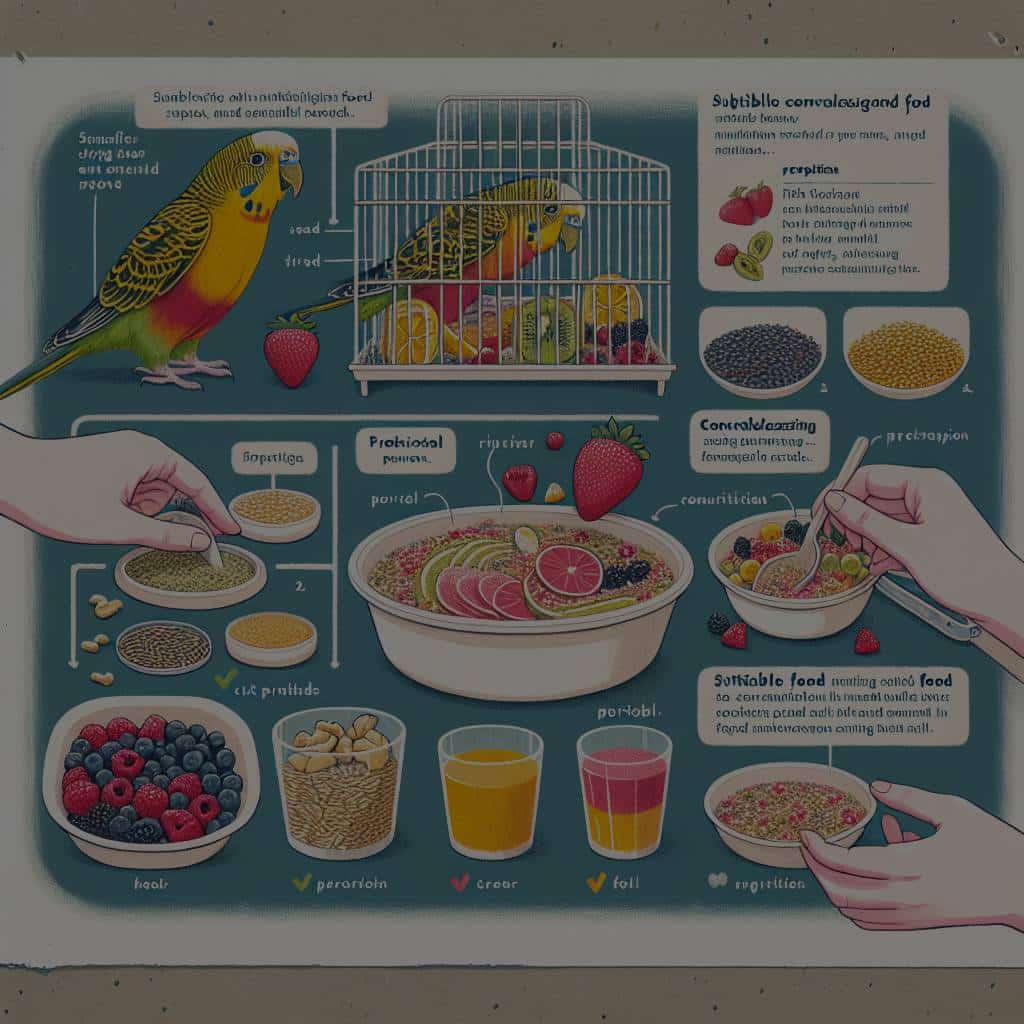How to Prepare a Nutritious Diet for a Convalescing Bird?

Caring for a sick or recovering bird requires attention to detail and understanding of avian dietary needs. Birds are delicate creatures, and their nutritional requirements differ considerably from those of other pets. Just as we take extra care in our meals when we’re ill, our avian friends need specialized diets to regain their strength. Feeding birds the correct food during recovery is crucial in restoring their health. Let’s delve into how we can ensure that these avian beauties receive the proper care and diet needed during their period of convalescence.
Recognize the Critical Importance of Weight Monitoring
The practice of weight monitoring is often overlooked but is pivotal in assessing a bird’s health. Birds, with their high metabolic rates, can quickly lose weight during illness. Therefore, noticing weight loss in your bird can be an initial alarm for underlying health issues. Weighing your bird regularly will not only allow you to detect any problems early but also provide vital information on their recovery progress.
Also to discover : What Are the Best Organic Flea Control Methods for Sensitive Cats?
When monitoring your bird’s weight, consistency is key. The same scale should be used each time, and weights should be measured at the same time of day. Most importantly, any drastic weight change should be promptly addressed with your avet, as it could indicate a life-threatening situation.
Understand the Role of a Balanced Diet
Feeding your convalescing bird a balanced diet is key to their recovery. Birds require a diet rich in proteins, vitamins, and minerals, alongside an appropriate balance of carbohydrates and fats. The ideal diet for a sick bird should be high in energy content to help them regain strength and weight. It’s important to remember that the nutritional requirements vary among different bird species, so always consult with a veterinarian to understand the specifics of your pet’s diet.
Also to see : Can Dogs Benefit from Listening to Classical Music and How?
Your pet bird’s food should primarily consist of a high-quality pellet formula. Pellets are nutritionally balanced and easy for birds to digest. They provide a good source of protein and essential nutrients, making them an ideal diet choice for a convalescent bird.
Administering Food and Water by Hand
In some cases, when your bird is severely ill, you might have to feed and water them by hand. This can be a painstaking process that requires patience, but it’s critical to nursing your bird back to health.
There are specially designed feeding syringes available which can be used to administer soft or liquid foods. Always ensure the food is lukewarm before feeding, as hot foods can cause burns to the bird’s mouth.
The food should be administered gently and at a pace comfortable for your bird. Observe the bird’s response to eating and drinking, as any signs of distress or difficulty swallowing should be taken seriously.
Importance of Hydration
We cannot emphasize enough the importance of hydration in a bird’s diet, especially during recovery. Birds are prone to dehydration during illness, which can slow down their recovery process. A dehydrated bird can become lethargic and lose weight rapidly.
Ensure your bird has access to fresh, clean water at all times. If your bird is reluctant to drink, you may need to administer water by hand using a feeding syringe.
The quantity of water your bird needs will depend on their size and weight. As a general rule, most birds will need around 5% of their body weight in water each day.
Special Dietary Supplements
During the convalescence period, your bird may benefit from certain dietary supplements. These can be useful in boosting the bird’s immune system and aiding their recovery.
While it’s always best to consult a veterinarian before adding any supplements to your bird’s diet, some beneficial ones include probiotics, vitamins, and minerals. Probiotics can help in maintaining a healthy gut flora, which aids digestion and absorption of nutrients.
Depending on your bird’s condition, adding high-energy foods such as nuts and seeds to their diet could also be beneficial. However, these should be given in moderation, as they are high in fat.
Hand-feeding your bird during convalescence can be a challenging task, especially if you have never done it before. However, with patience and practice, you can help your bird regain its health and vitality. Remember, a nutritious diet and proper care are the most critical factors in a bird’s recovery.
Using Critical Care Specialist Diets for Convalescing Birds
Addressing the specific needs of a convalescing bird involves providing a diet designed for recovery. A major component of the recovery process includes the use of specialist diets often termed as critical care diets. These diets are high in energy, protein, and full of necessary vitamins and minerals that aid in the bird’s recovery.
One popular example of such a diet is the Harrison’s Bird Foods recovery formula. This high potency formula is designed to provide essential nutrients to sick or recovering birds. It’s excellent for hand rearing or weaning birds, and can be easily digested and absorbed, thus enabling the bird to regain strength swiftly.
Another significant thing to remember is that sick or recovering birds may not have the will or strength to eat. In such cases, hand feeding can be highly beneficial. This involves administering the recovery formula or any soft food directly into the bird’s mouth using a feeding syringe.
However, if your bird refuses to eat, it’s crucial to seek immediate advice from a veterinarian. Anorexia in birds can lead to rapid weight loss and is a serious health concern. Remember, a bird that is not eating needs urgent care and should be seen by a vet as soon as possible.
Providing Supplemental Heat and Care for Convalescing Birds
When a bird is sick or recovering from an illness, it may not be able to maintain its body temperature effectively. This is where supplemental heat comes in. Providing supplemental heat helps the bird conserve energy that would otherwise be used to generate heat. This conserved energy can then be utilized in the recovery process.
You can provide supplemental heat using a heating pad or a heat lamp. However, it’s important to ensure that the bird can move away from the heat source if it becomes too hot to avoid overheating. Monitor the bird’s behavior closely. If it’s trying to move away from the heat or if it’s panting, it may be getting too hot.
Apart from diet and temperature control, remember that sick and recovering birds need a lot of rest. Minimize stress by keeping the environment quiet, calm, and free from disturbances. Keep a close watch for any changes in behavior, as this could be a sign that the bird’s condition is worsening or improving.
Finally, don’t overlook the emotional care that your bird requires during this time. Your presence, gentle handling, and soothing voice can work wonders in the recovery process.
Conclusion
Taking care of a convalescent bird requires a thorough understanding of their dietary needs, close monitoring, and a lot of patience. Providing a balanced diet specifically designed for bird recovery, hand feeding when necessary, and ensuring your bird is adequately hydrated are all critical in helping your avian friend regain their health.
Moreover, providing supplemental heat and creating a tranquil environment can significantly aid in the recovery process. It’s crucial to remember that all birds are unique, and what works for one might not work for another. Thus, the most successful recovery plans are often tailored to the specific needs of your bird under the guidance of a veterinarian.
Finally, do not forget about the power of love and the healing effects it can bring. Your dedication and care can make all the difference to your recovering bird. After all, pet birds are not just pets – they are part of the family.
